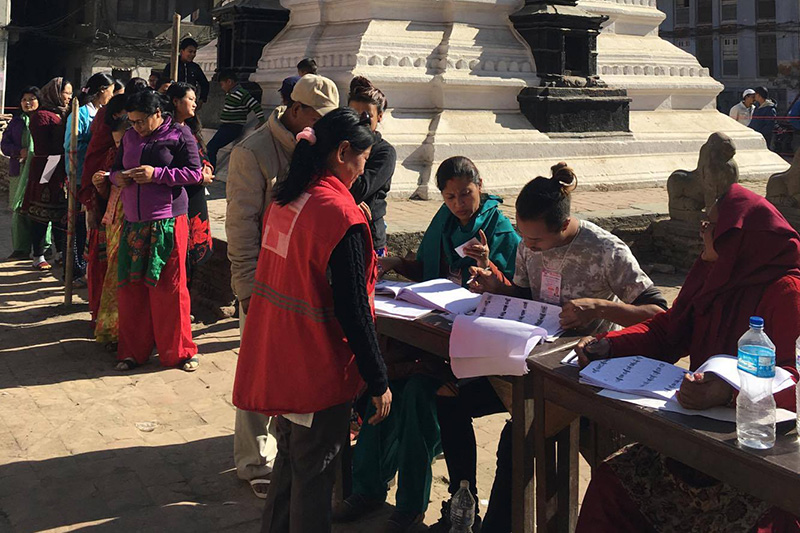Parties flagrantly violated code of conduct: Report
Kathmandu, November 16
Political parties and their candidates flagrantly violated the code of conduct, especially regarding election expenses, during the local, provincial and parliamentary elections that concluded in December last year, according to an election observation report published today.
Candidates were found to be excessively spending money in election materials, campaigning, vehicle use, and partying against the ceiling for campaign expenditure, states the joint report prepared by the National Election Observation Committee, General Election Observation Committee and Sankalpa — Women’s Alliance for Peace, Justice, and Democracy. “In some cases, candidates were found distributing money to voters who had wooed for them,” states the report. “There were also reports of few arrests of people who had attempted to bribe voters during the silent period.”
The report says the Election Commission and the government, however, were not found strict in ensuring implementation of the code of conduct, and that action against the violators were just limited to seeking explanations and issuing warnings. “In few places, even the local office bearers were engaged in campaigning,” states the report.
To address this, the report recommends that only election expense cap is not enough and that the whole process of political financing should be taken into account. “A comprehensive law and its effective implementation is the demand of the day.”
The report also concludes that majority of the people were unable to register as voters due to less time allocated for the same, while the names of many were either missing or were registered erroneously. Although the use of voter identity cards helped in drastically reducing the number of fake voters, there were instances of multiple and proxy voting, exploiting the provision of assisted voting for differently-ambled voters.
The report points out inadequate voter education whereby voters were confused due to large-sized complex ballot papers, contributing to the highest number of invalid votes in the history of elections in Nepal.
As far as inclusion is concerned, most of the parties fielded few women under the first-past-the-post electoral system, with some districts seeing zero women candidates. “The only important factor the parties conceded while fielding candidates seemed to be the ability of candidates to win,” states the report, adding many polling centres were not easily accessible for the elderly and people with special needs.
Nevertheless, mandatory constitutional provision resulted in the election of 14,354 women representatives at the local level and significant women’s participation in campaigning and voting.
According to the report, the mixed electoral system has created two classes of representatives — the FPTP members treated as ‘elected’ and proportional representation members as ‘nominated’, developing a psychology of ‘superiority’ and ‘inferiority’ among members of the same parliament. “Both the state and the parties should need to plan and invest resources for the individual capacity building of the members, especially those elected from PR quota,” the report recommends.
The report has recommended that the EC should ensure that electoral rolls be updated periodically, making election date transparent, and enhancing electoral education by initiating long-term programmes. It has also advised making necessary arrangements to ensure vote counting soon after the close-down of the polling centre.
The report has recommended to the government to ensure the EC is allowed to function with full autonomy and independence, take steps to guarantee the right to vote for all polling officers, security personnel and observers, and explore mechanisms to enable Nepali citizens abroad to vote.






